
Boundless Love

Yes ladies, it’s Valentine’s Day! That one day each year when the special man in your life frantically searches out just the right card, visits a florist for roses, picks up a box of chocolates or maybe something very sparkly, all to show you just how much he loves you. And retailers, florists, and jewelers work exhausting hours in anticipation of great monetary rewards. Let’s not forget restaurants that gear up for enormous crowds and add enormous automatic gratuities to your check because it’s a special “holiday.” All of this in the name of “love”!
florist for roses, picks up a box of chocolates or maybe something very sparkly, all to show you just how much he loves you. And retailers, florists, and jewelers work exhausting hours in anticipation of great monetary rewards. Let’s not forget restaurants that gear up for enormous crowds and add enormous automatic gratuities to your check because it’s a special “holiday.” All of this in the name of “love”!
Don’t get me wrong, I enjoy those romantic gestures as much as anyone. But I also know that love is much more than gifts and a special dinner out. Love is getting up early to put the coffee pot on. Love is washing dishes when a spouse has had a hard day or maybe just because you feel like doing it. Love is caring for a sick spouse, meeting the large and small needs as well as all the nasty ones. Love is washing the car when he’s had a very long week. Love is sharing parenting duties. Love is a hug when it’s least expected, a hot cup of tea as the long day ends. Countless simple everyday gestures speak more love than all the extravagances we heap into this one day.
Something else happens today and it has impacted humanity more than any other event in our history. Today we begin the journey of Lent. Once again we are preparing ourselves, though not for the birth of a promised Messiah. This time we prepare to walk alongside that child who has become a man on his tortured pathway to a cruel cross. Over these next weeks, we’ll look at the words shared in Galatians, words that describe what and who we are to be as children of the Trinity. (You’ll note that I use God, Jesus, & Holy Spirit interchangeably because they are.)
 But the Holy Spirit produces this kind of fruit in our lives: love, joy, peace, patience, kindness, goodness, faithfulness, gentleness and self-control. Galatians 5: 22-23a
But the Holy Spirit produces this kind of fruit in our lives: love, joy, peace, patience, kindness, goodness, faithfulness, gentleness and self-control. Galatians 5: 22-23a
The attributes shared here describe the foundation of who Christ was as He walked this earth. Love, as we define it, is a romantic feeling for another person. Though it seems the most important element of our lives when we are engaged in a romantic relationship, our human feeling of love can never reach the depth of boundless love that God, through Jesus and the Holy Spirit, has for us, his precious children. It’s a love we can’t begin to understand because it is divine. It demonstrates itself in His ability to forgive when we hurt Him repeatedly. In His constant provision for us. In His constant presence through the Holy Spirit. Most importantly in His willingness to place His own Son on a cross. And that the Son was willing to bear the burden of pain and death for only one reason. He loves us and He knew, as did his Father, from the beginning of time, that we would need forgiveness.
God gave us all an enormous gift—the freedom of choice. This could be the most amazing
feat He could have ever done. He made us and loved us beyond anything we could
possibly imagine. Then He left it up to us to love Him back.
Erika Bentsen, Walking In Grace 2024
Because He gave us freedom of choice, the opportunity to stumble and fall became inevitable. We are only human. But He offers us recklessly, over-the-top, boundless love that can overcome anything we can manage to get ourselves into. You will recall there were two criminals, one on each side of Him as He hung on the cross. Even after all the crimes they had committed, they had the opportunity to turn away from what they had done and be reconciled with God. One chose heaven and it was granted to him. The other scoffed and turned his back on Jesus. We know where he is spending his eternity.
recklessly, over-the-top, boundless love that can overcome anything we can manage to get ourselves into. You will recall there were two criminals, one on each side of Him as He hung on the cross. Even after all the crimes they had committed, they had the opportunity to turn away from what they had done and be reconciled with God. One chose heaven and it was granted to him. The other scoffed and turned his back on Jesus. We know where he is spending his eternity.
God’s love doesn’t know boundaries, doesn’t hold grudges against those who confess their sins, and doesn’ t abandon us in our fears and doubts. He just keeps on loving and he wants us to do the same. There are people around us who need to feel God’s reckless, over-the-top, boundless kind of love.
Enjoy all the treats this Valentine’s Day will bring and always be a loving child of God wherever you are needed.
Nothing in all creation will ever be able to separate us from the love of God…(except ourselves) Romans 8:39b
Read more...

Are You Moldable?


We are like clay, and you are the potter; your hands made us all. Isaiah 64:8
Over the years, I have collected many ceramic pieces that add beauty to our home. Whenever we visit a flea market, I stroll the aisles searching for something that strikes me as different from those I have and in a color that will blend with our décor. The pieces often seem to choose me. However, I’ve needed to become quite selective as my collection had outgrown the shelf space needed to use them artfully and efficiently. My pieces aren’t worth much—they just appeal to my personal taste.
My plants live in pots shaped in many ways—some are tall and cylindrical while others are short with a wide mouth. They come in shades of green, brown, jade, off-white, and deep rich orange, even a touch of dark burgundy, all earthy in their appearance. I have several that nearly form a ball with very small openings at their tops while others are rather flat in nature making them excellent candidates for narrow shelves. By placing them artfully, they enhance the lovely counted cross-stitch pieces that Ken has so expertly crafted as well as my pen and Ink drawings. They even nestle amid some of Ken’s lovingly restored antique tools.
 Like the majority of today’s pottery pieces, my pots and vases are all machine-made and mass-produced, but creating genuine hand-crafted ceramic pottery is an ancient artform that probably had its origins in the Far East, Middle East, and Sub-Saharan Africa. Wherever and whenever they’re made the pieces start as an unassuming lump of clay which is then shaped into the desired vessel and heated in a hot fire, 600-1600°C. This can be accomplished in a bonfire, pit or kiln. The extreme heat changes the properties of the clay, making it stronger and more rigid. While early pottery was principally functional, ceramic work has evolved into a fine art category.
Like the majority of today’s pottery pieces, my pots and vases are all machine-made and mass-produced, but creating genuine hand-crafted ceramic pottery is an ancient artform that probably had its origins in the Far East, Middle East, and Sub-Saharan Africa. Wherever and whenever they’re made the pieces start as an unassuming lump of clay which is then shaped into the desired vessel and heated in a hot fire, 600-1600°C. This can be accomplished in a bonfire, pit or kiln. The extreme heat changes the properties of the clay, making it stronger and more rigid. While early pottery was principally functional, ceramic work has evolved into a fine art category.
But the jar he was making did not turn out as he had hoped, so he crushed it into a lump of clay
again and started over. Jeremiah 18:4 (if this scripture gave you pause as it did my husband,
grab your Bible and read verses 1-10 of Jeremiah 18 or read the whole chapter to put it in context.)
Pots or other utensils may be built completely by hand or thrown on a wheel. Potters have always been a source of curiosity to me. I’ve watched a friend of ours and other potters throw an object that doesn’t meet their specific standard against a wall, retrieve it and start over. The clay is very forgiving and is an excellent format to implement the old saying, “If at first you don’t succeed, try, try again!” There was a time when I thought destroying a piece of pottery was a terrible waste. But as a pen and ink artist, I quickly learned that it is important that the piece, whatever it may be, has just the right form and style as seen through the artist’s eyes.
Clay as an artform, sculpture of the human body, lifeless without the touch of God.
And, of course, that brings me to another crossroad of thinking. God made us in His Image. He is the potter. He holds us in his hands and sculpts every feature to his exact specifications. Imagine being held in the loving hands of God throughout your own personal creation. He sculpted a face that was lovely to His eyes. He shaped a body that was in every way perfect to Him. He placed us inside a warm incubator and let us rest there until it was time for us to be born into this wonderful world He also created.
Sometimes, He adds something to our body that we would choose not to have or He may leave out an organ considered necessary, but when we learn that in His love He sees us as perfect, we can turn that perceived defect into good. It can bring us closer to the Father.
That’s why God never completely removed whatever it was that Paul called his “thorn of my flesh”
(Corinthians 12:7). It kept Paul humble and leaning every day on the grace of God. Bear Grylls, Soul Fuel
Whatever our perceived flaws, God sees past them and into our hearts. If God was able to create us, He is also able to change us, retrieve us from a life poorly chosen, forgive us for bringing tears to His eyes by our behavior. We are like the jar that the potter mashes back into a lump of clay. God can rework the clay and take us back to the perfect creation we were when His own hand placed us in our mother’s womb.
Let Him mold you and make you into the person He sees as perfect…the perfect YOU!
The Creator had created, not a creature but another creator. And the one who had chosen love had created
one who could love in return. Max Lucado, Eye of the Storm
Read more...

What Looks back at You?


When you look in the mirror, what do you see? I find looking back at me a full head of gray hair, of which Ken is very envious because his locks have diminished throughout the years. A myriad of wrinkles, from head to toe, greets me. Ken is not envious of those. A scar here and another there indicates the location of a previous injury or surgery. Ken has his own share of those. All my body parts have succumbed to the force of gravity, and we share that trait, so no envy is involved and, of course, we are instructed not to feel envy toward others. But being human, it happens occasionally, despite our best intentions.
If you look beyond the physical, deep down to the core, what emotions do you find? Do doubts and fears linger there? Do you harbor a grudge against someone you say you love or once considered a good friend? Is anger or a perceived hurt worming its way so deeply into your heart that it clouds all your other emotions? Does depression hang over you like a heavy gray cloud that never lifts to allow the sun to shine through? That’s a pretty dismal picture!
So God created human beings in his own image. In the image of God he created them; male and female he created them. Genesis 1:27

What do you suppose God sees when he looks into your face? What does he feel when we allow negativity to dictate our life’s path? He created us in his image and if we exhibit the traits of fear, anger, or envy, and are disrespectful of the body and mind that he created, we are certainly being disrespectful of the gifts he has showered on us. Maybe we just need an attitude adjustment.
According to the Mayo Clinic, “Positive thinking doesn’t mean that you ignore life’s less pleasant situations. It means that you approach unpleasantness more positively and productively. You think the best is going to happen, not the worst.”
If you’re a parent or grandparent, you know that you earned every one of those gray hairs on your hea d or your lack of hair…would you trade them for a shining new deep brown mane that always does just what you want it to do? Time may have etched craters into your face, but along the way, wisdom has crept into your mind and heart. You still have time to work on those sagging body parts. A little exercise goes a long way toward toning up those long-abandoned muscles. And all those scars we observe in the mirror weave the tapestry of our lives, they remind us of the adventures we’ve had, the adversities we’ve endured, and all the instances when God “saved our bacon,” as the saying goes.

When God looks at us he sees his miraculous and perfect creation. He made us the way he wanted us to be. Every gray hair, every wrinkle, every scar is a testament to a life fully lived. What better gift could we receive than knowing God loves us just the way we are.
He placed his hand on the shoulder of humanity and said, “You’re something special.”
Max Lucado, Grace for the Moment Volume I
Read more...
What Are You Hiding?
 Nothing in all creation is hidden from God’s sight. Hebrews 4-13
Nothing in all creation is hidden from God’s sight. Hebrews 4-13
Peek-A-Boo! I see you! You’ve covered your eyes and asked, “Where’s Mommy?” or “Where did Daddy go?” Suddenly you uncover your face and squeal, “Here I am!” If you don’t scare your very young child half to death, he or she will provide the big smile you were looking for. It’s likely the first game you play with your baby and that child will catch on very quickly. Before you know it, you’ll get the full belly laugh you were hoping for. Soon that tiny being will be covering his own eyes or she will hide behind a favorite “blankie” only to reappear and wait expectantly for your surprised response. And, of course, you’ll be right there, shocked that this tiny being has reappeared and thoroughly convinced that you have the smartest baby on earth.
Hiding and waiting to be found is a natural human phenomenon. At any age, and no matter who we are, we tend to hide activities we may feel are questionable or thoughts we know we shouldn’t have. Don’t deny it…it’s inevitable! Think back to the Garden of Eden before you protest. We all wear masks at times, trying to fool others into thinking we are something different than we really are. And that may work for a while with other humans. After all, if we continually hang out with the best and brightest, maybe a little of their luster will rub off on us. But eventually, the truth will surface.
shouldn’t have. Don’t deny it…it’s inevitable! Think back to the Garden of Eden before you protest. We all wear masks at times, trying to fool others into thinking we are something different than we really are. And that may work for a while with other humans. After all, if we continually hang out with the best and brightest, maybe a little of their luster will rub off on us. But eventually, the truth will surface.
With God, there is never a time when He doesn’t know your real feelings or doesn’t have a window into those questionable activities. If a tiny little doubt niggles at your brain, He’ll know it. The good part about that is, unlike your human counterparts who may toss you under the bus when they realize your failings, He will reach out His hand and say, “I forgive.”
God has never expected His creation to be flawless. From before time began, He knew we would need real visual proof that He exists and wants to enter into a relationship with each of us. He sent us Jesus to make that human connection, to give us a God with skin and hair, eyes and ears, a heart beating inside His chest. And that heart beats with a love for you that is so full and so complete, He can forgive anything you do.
God Isn’t Afraid of Our Doubts. He’s Way More Concerned When We Fake It.
 Doubts will come! As much as we would like to protest that we never doubt God, it happens. When a relationship unravels and breaks apart, when the doctor delivers a diagnosis we hadn’t expected, when the job we thought would last for as long as we wanted it suddenly vanishes or, perhaps several challenges attack us from all sides, we will question where God is, why this is happening to us, why doesn’t He understand how much we’re hurting. He does! He’s always there for us. It is we who have fallen away from Him. But He created a way back for all of us through the giving of the greatest Gift of all, His own Son.
Doubts will come! As much as we would like to protest that we never doubt God, it happens. When a relationship unravels and breaks apart, when the doctor delivers a diagnosis we hadn’t expected, when the job we thought would last for as long as we wanted it suddenly vanishes or, perhaps several challenges attack us from all sides, we will question where God is, why this is happening to us, why doesn’t He understand how much we’re hurting. He does! He’s always there for us. It is we who have fallen away from Him. But He created a way back for all of us through the giving of the greatest Gift of all, His own Son.
So, instead of hiding behind a mask, or a “Blankie”, we just need to share those doubts and questions with Him. He will forgive and He will provide answers in His good time. It’s time to get real and trust Him with your doubts, your anxieties, your failures. No failure is so big that God can’t forgive it. Just give Him a chance.
We need to get real enough with Him about our doubts so He can be Jesus enough with His grace.
Quotes, other than Biblical, are from Live In Grace, Walk In Love by Bob Goff
Read more...
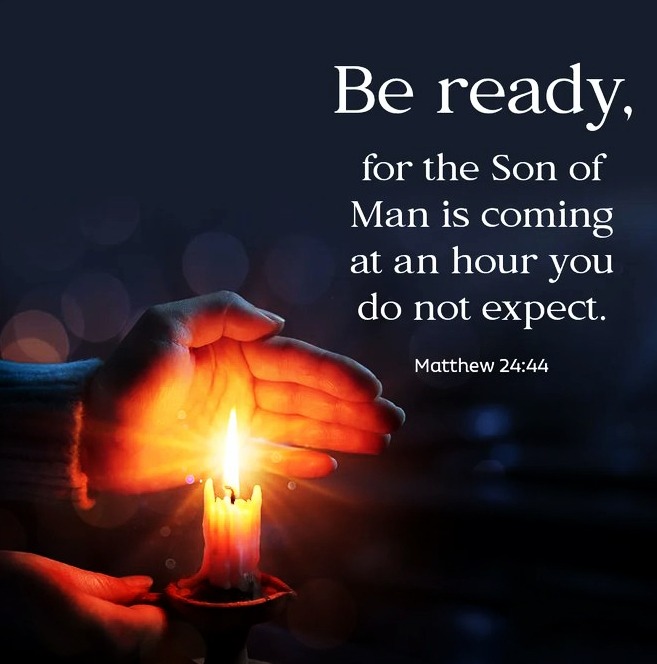
If Jesus was Coming Tomorrow

If you knew Jesus was coming tomorrow, what would you do today?

Max Lucado, Because of Bethlehem
This quote and another to follow later were taken from a great little book by beloved author, Max Lucado, called Because of Bethlehem. Most of the book is focused on the birth of Jesus and the impact His coming had on this world, or should I say the lack of impact. The humans of that day, as well as those of today, were so busy scurrying to keep up with their own plans and packed schedules that they hadn’t the time to spare for a humble birth in a dirty stable. Later in the book, Max turns to Jesus’ return trip to Earth and the very profound impact it will certainly have on each and every one of us. For one day, we will come face to face with Jesus, that much is certain. The uncertainty is in the “when” of the event and in its outcome. Will He welcome us with open arms or will He not? And, if there was a grand announcement that tomorrow was the day of his return, what would you do with this last day you had on earth?
Ken has been quite focused on the seismic activity that has kept parts of Iceland in turmoil for several months. The epicenter of this activity threatens to destroy a little town called Grindavik. To most people, it would just be a tiny, unheard-of town that has had to be evacuated because of the inherent risk of eruption, but to Ken, it was home for a year when the US Air Force stationed him in Iceland. As drones buzz over the town, he can follow the roads that he walked in the early 1960s and grasp where this path of destruction is headed. It was heartbreaking this morning when the first houses in the town were ignited by the heat of erupting lava. The upside to the story is that all the residents have been evacuated. They had a warning and they moved to other places and, though they will likely never live in Grindavik again, they are alive.

Most of us can recall the devastating tornado that struck Joplin in 2011. Those people had little to no warning and many of them died. Others were left homeless and without employment but were alive. During the three years that we lived together in Florida, we learned a great deal about hurricanes and, when we returned to Missouri, people often asked about our fears concerning hurricanes. The answer is a simple one. You almost always have enough warning to get away from them. They may destroy the things in your life, but you will live to tell the stories.
Nature’s dramatic interruptions in our lives are usually manageable if we use our common sense and listen to warnings from experienced people who have studied the specific phenomenon and dealt with the actual occurrence of each type of natural disaster. Our warning systems are not infallible, but they do save a lot of lives.
You also must be ready all the time, for the Son of Man will come when least expected.
Matthew 24:44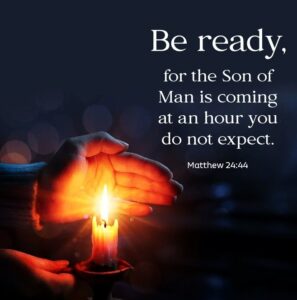
When Jesus comes, there won’t be a warning siren or church bells. We’ll just be face-to-face with Him. What will you do on your last day? I know that I am ready to be taken home. Oh yes, I’ve stumbled, I’ve fallen flat on my face, I’ve made so many mistakes I can’t begin to count them. But, He has picked me up every time and set me back on the right path. I know that He is my Savior and I try to live in a way that would please Him, not to humiliate or dishonor Him. And when I fail, I know I can go to Him and earnestly repent. He will forgive. I know beyond a shadow of a doubt that when He comes again, He will welcome me and lead me to eternity with Him.
Knowing all of that, I believe I would spend that last day visiting or talking to the people who have been an important part of my time on earth. I’d like to tell them how much they’ve meant to me, and that I care about them. I’d like to make one more effort to help them feel the love of God in their lives if they haven’t fully experienced it. I’d like to know if we’ll share a heavenly home. Perhaps I’d better get busy doing the work I was sent to do because we don’t know when He’ll come for us and I want to be as ready as I can. What would you do if you knew Jesus was coming again tomorrow?
Then do it. Live in such a way that you would not have to change your plans.
Max Lucado, Because of Bethlehem
Read more...
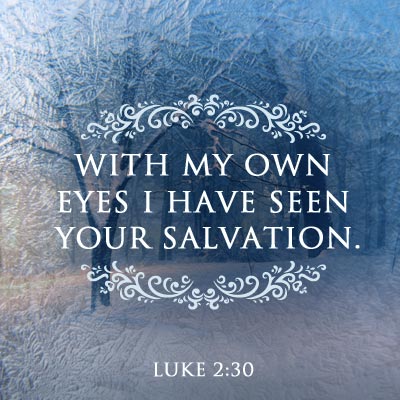
The Tweens

No, I don’t mean that awkward time when pre-teens are attempting to spread their wings a little more than parents would like and feeling caught between childhood and full-fledged teen years.

I’d like to explore those weeks between Advent and Lent, that time when we have just celebrated a miraculous birth, and all too soon will contemplate a tortuous journey leading to a lonely cross on a hillside. We are offered little about the human Jesus between his birth and his ministry and that allows fertile ground for imaginations to wander.
Simeon was there. He took the child in his arms and praised God, saying,
“Sovereign Lord, now let your servant die in peace, as you have promised.
I have seen your salvation, which you have prepared for all people,” Luke 2:28-31
We know that Jesus was taken for circumcision at eight days, as required by Jewish Law. He was also, by law, presented at the Temple on the fortieth day after his birth, where he encountered Simeon and Anna. And, of course, we remember that when his parents lost him as they were returning home from Passover, they later found him teaching his elders in the Temple. That’s a very thin biographical resume for anyone, but for one destined to be King of God’s chosen people, we would expect more.
In today’s world, parents would take endless photos, especially of a firstborn child. There would be anxious moments as this bundle of joy pierces the night with cries of hunger or pain. There would be the usual firsts; first smile, rolling over, sitting up, first steps. Then comes the first day of preschool or kindergarten, the first boyfriend or girlfriend, first dance. There would be teenage dreams of what the future  might hold residing right alongside athletic aspirations and preparing for a driver’s license. Let’s not forget high school graduation, going off to college, or into a new job. Perhaps this child would follow in the parent’s footsteps but most often, would branch off in an entirely new direction. Then the cycle begins again. The child marries, becomes the parent, and eventually the grandparent….and life just keeps rolling along.
might hold residing right alongside athletic aspirations and preparing for a driver’s license. Let’s not forget high school graduation, going off to college, or into a new job. Perhaps this child would follow in the parent’s footsteps but most often, would branch off in an entirely new direction. Then the cycle begins again. The child marries, becomes the parent, and eventually the grandparent….and life just keeps rolling along.
Obviously, the culture was much different in Jesus’ day. But he would still have wanted his clothing changed when soiled, he would have needed someone to feed and dress him until he could accomplish those tasks for himself. Most likely, he would have followed his father in the family trade. I have often pictured the boy, Jesus, standing alongside Joseph wielding a hammer or sawing a piece of lumber. I think he would also have loved animals and participated in their daily care as well as rollicking with them in the grass. But I can envision him at Mary’s side in the kitchen as well, for I believe he, being God in the flesh, respected and revered his mother and enjoyed spending time with her. We read about his sharing equality with women throughout his later ministry. I believe he must have engaged in the games of the time with siblings and friends. I can certainly imagine that he would have lived life to its fullest in those early years, but I find it harder to visualize him as a young man in that decade before he began his ministry in earnest.
Because he never traveled far from home, we must assume that he continued to help his parents during his twenties and to deepen relationships with his contemporaries. But he didn’t follow the typical path of marriage and family. He did not experience that aspect of human life. When the day came for his earthly ministry of bringing an understanding of God to the human mind of his day, he was greatly focused. Earthly family members, while not forgotten or neglected, were no longer part of his closest circle. His focus shifted to training trustworthy disciples who would be prepared to carry the message in his eventual absence. 
Think about it, from before the beginning of time, Jesus carried the burden that he would one day come to earth in the form of a helpless human infant. He would experience every human condition and emotion yet remain free of sin. He came knowing that his very own creation would convict him of a crime with no merit in a mockery of a trial. They would then beat and torture him, before attaching a crown of cruel thorns to his head, march him through the streets carrying his own cross, and then nail him to it. They would pierce his side, cast lots for his clothing, and leave him for dead. Who would willingly assume that burden?
Jesus did!
He did it for me and he did it for you!
It seems we are in a state of constant preparation, first birth, then death. We’re just a few weeks from the beginning of Lent. It’s time to sharpen our focus on eternity. Are we as prepared as Simeon was? Let’s use our “tween time” well!
Read more...
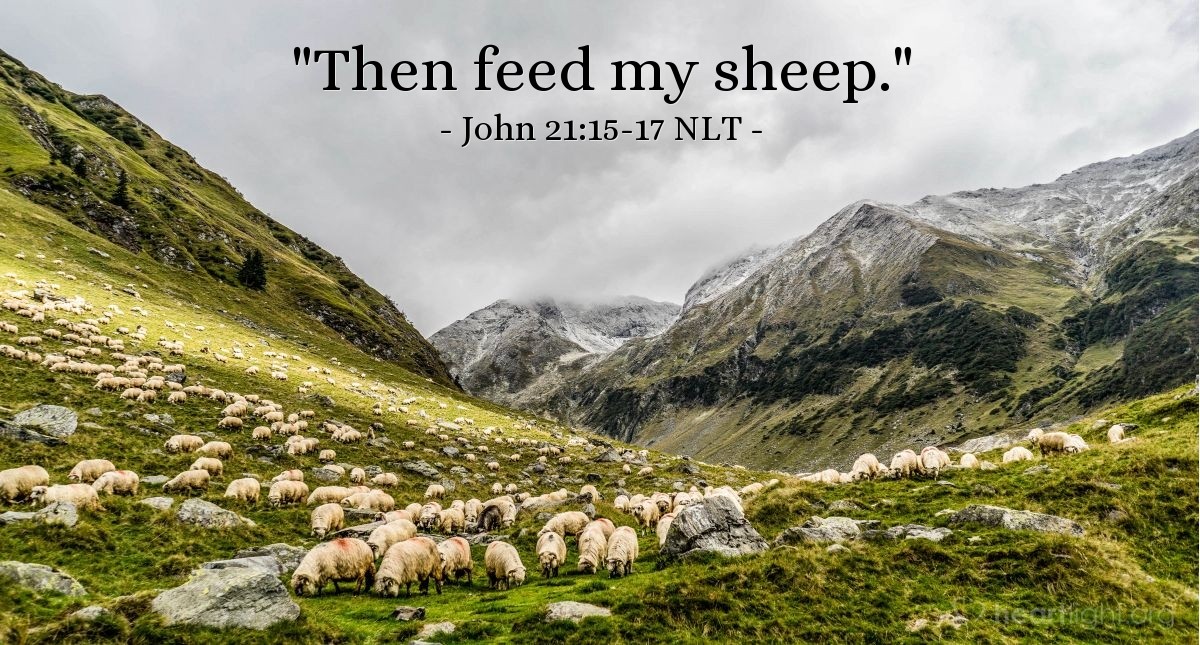
Feed Your Sheep


After breakfast Jesus asked Simon Peter, “Simon son of John, do you love me more than these?” John 21:15a
As I write, we have just arrived home from church on the eve of a brand new year. It was blustery and cold out as we made a couple of stops, the last at Papa Murphy’s for a pizza to help us ring in 2024. The warmth of home feels wonderful to me right now and I ponder a crackling wood fire (I’ll have to settle for gas) and the warmth of a cuddly wool sweater, a good book, some quiet music…let’s not forget a cup of steaming chocolate topped with gooey marshmallows. That would represent a perfect winter evening in my dreams.
I began to wonder how many people and their gifts would be needed to provide all that. First, I would need brickmakers and a stonemason, because there is no wood-burning fireplace in our current home. Next, because I’m not as young as I used to be and neither is Ken, we’d need a strong young person to cut and gather wood for us. The book would require an author, publisher, printer, and marketing staff. My music selections would first need to be imagined and written, then recorded and mass-produced, and finally sold by retail clerks. The chocolate would need to be nurtured in some faraway country or Hawaii (often considered a faraway country), then harvested and  processed, transported and stocked on the grocery shelf. As for the marshmallows, I’ll leave those to your imagination as mine just conjures images of a great sugar explosion. And then, there is that warm wool sweater…let’s see now, what do we need? Clearly, a wooly sheep or two would be a priority, then the farmer must shear them, the wool will need to be transported and processed and before that sweater warms my body, someone must knit it by hand or machine.
processed, transported and stocked on the grocery shelf. As for the marshmallows, I’ll leave those to your imagination as mine just conjures images of a great sugar explosion. And then, there is that warm wool sweater…let’s see now, what do we need? Clearly, a wooly sheep or two would be a priority, then the farmer must shear them, the wool will need to be transported and processed and before that sweater warms my body, someone must knit it by hand or machine.
“Yes, Lord,” Peter replied, “You know I love you.”
Wow! While I’m sure I left a few out, that’s a lot of people with a lot of different skills and varying income and societal levels. But they have all one very special thing in common. They’re all sheep….no, not the smelly, wooly kind that the farmer sheared for the sweater in my dream. We’re all the sheep of God’s pasture and Jesus is our loving Shepherd. I recall a time when I didn’t like being called a sheep, after all, they are smelly and not terribly smart. But with age, we hope, comes a certain measure of wisdom. I’ve learned that when I wander away from my flock, He comes for me. When I forget to do the everyday kindnesses that should be habit by now, He forgives me. When I don’t ask the new neighbors if they have a church home and, if not, invite them to ours, He reminds me to do better the next time I see them.
“Then feed my lambs,” Jesus told him.
If you recall the conversation between Jesus and Peter, the question was repeated twice more, causing Peter no small degree of confusion. In this illustration, lambs can be compared to baby Christians, those who have just recently made a decision to follow Jesus. The second time Jesus admonished Peter to “Take care of my sheep.” The third reply was, “Feed my sheep.” I believe He wants us to leave our comfort zone and go in search of the lost lambs. He wants us to nurture them and help them grow into sheep, but our task doesn’t end there. We must then care for those maturing sheep and be sure they are fed regularly so that they will want to continue to be part of the flock of Jesus’ followers until their earthly journey ends.
The word “feed” may be taken literally or metaphorically. Some in our midst literally need help being fed and we should be there for them, but we all need spiritual feeding on a daily basis. Just as the Israelites collected manna each morning in the desert, we must collect spiritual manna from the things that influence our thinking and behavior. Be sure your sources are aligned with God’s teaching and your pastures will always be nourishing.
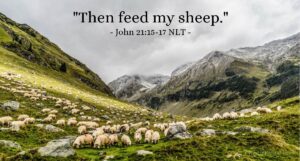
“If a man has a hundred sheep and one of them wanders away, what will he do? Won’t he leave the ninety-nine others on the hills and go out to search for the one that is lost? And if he finds it, I tell you the truth, he will rejoice over it more than over the ninety-nine that didn’t wander away. In the same way, it is not my Father’s will that even one of these little ones should perish.”
Matthew 18:12-14
Read more...

The Perfect Gift

 Every good gift, every perfect gift, comes from above. These gifts come down from the father, the creator of the heavenly lights, in whose character there is no change at all. James 1:17 CEB
Every good gift, every perfect gift, comes from above. These gifts come down from the father, the creator of the heavenly lights, in whose character there is no change at all. James 1:17 CEB
The gifts have all been opened, some may have already been returned, the wrappings thrown in the trash and some of the new toys might already be broken. But, if you were paying a lot of attention to TV ads before Christmas, or surfing all your favorite social media sites, or checking out every marketing message you received on your phone offering a blazing hot deal, you were likely drowning in commercialism and losing focus on our reason for all the gift giving.
As we know, our practice of gifting family and friends at Christmas is grounded in the presentation of gifts to the Christ Child by the Magi, those mysterious travelers from the Far East who followed the guidance of a very bright star to find the promised Child. They learned of this birth from prophecies found in the Old Testament.
All nations will come to your light, mighty kings will come to see your radiance. Isaiah 60:3
The story seems very straightforward in its simplicity: Wise Men (educated men known for their knowledge of the sciences of astronomy and astrology, agriculture, and sorcery) followed a star until it led them to Jesus, the newly-born King of the Jewish nation. On the way, they had an encounter with the current Jewish King, Herod, asking them to report back regarding the whereabouts of the Baby. Because they were warned in a dream of Herod’s evil intent to kill the child, they returned home by another route, though some believe that the different route was a metaphor for their conversion experience upon being in the presence of the Lord. And Joseph, also having been warned of the danger to Jesus, traveled to Egypt where the family lived until Herod died.
From that seemingly simple story, many theories have emerged. The truth is, we don’t know how far the Wise Men traveled, we don’t know how old Jesus was when they arrived, but we do know they were not present at the manger on the night of His birth. Likewise, we don’t know where the family was living at the time of the auspicious arrival of the Magi. We do know that these men brought gifts, each of which was very valuable in that day and not readily available for the average home.
Most theologians agree that gold represented wealth worthy as a gift for a King, frankincense was likely indicative of the priestly role that Jesus would exhibit during His ministry here on earth, and myrrh was a precursor of the sacrifice He would make on the cross to save us from sin. But there are also discussions about the usefulness of the gold in financing the family’s exile into Egypt. Obviously, Joseph was not wealthy and that abrupt change in plans would have proven difficult for a man of his means. Hence, the theory does have value. Frankincense has long been, and still is in various countries of the Middle East and Africa, known for its therapeutic value and could have been intended for that use, but even more likely, in its rarest form it was considered pure and holy, thus reserved for ceremonial use and may have represented the pure and holy life that Jesus was called to lead. And myr rh was typically known as a perfume and one of the spices used at the burial of a dignitary. That would refer to the death of Jesus on the cross.
It was not suddenly or unannounced that Jesus came into the world.
The whole Old Testament is the story of a special preparation…only when all was ready,
only in the fullness of His time, did Jesus come.
Phillips Brooks, Minister in the nineteenth century, author of the lyrics to O Little Town of Bethlehem.
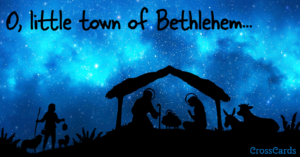 However it happened and whatever the timing, this beautiful yet fearful (because of the intended threat to Jesus’ life) portion of the Christmas story should teach us to pay special attention to the gifts we give. While gold doesn’t typically figure into that process, the value should be determined by how the giver honors the receiver. Our gifts to each other need not be expensive, in fact, they need not even be tangible. They can come in the form of kind words, a helpful hand when needed, a shoulder to cry on. After all, these are the very gifts that Jesus shared with everyone he met during His ministry here on earth and still offers to us now when we take the time to notice.
However it happened and whatever the timing, this beautiful yet fearful (because of the intended threat to Jesus’ life) portion of the Christmas story should teach us to pay special attention to the gifts we give. While gold doesn’t typically figure into that process, the value should be determined by how the giver honors the receiver. Our gifts to each other need not be expensive, in fact, they need not even be tangible. They can come in the form of kind words, a helpful hand when needed, a shoulder to cry on. After all, these are the very gifts that Jesus shared with everyone he met during His ministry here on earth and still offers to us now when we take the time to notice.
By offering these same kinds of gifts to family and friends, even strangers, we are giving to Him the very best gift we can ever give…our hearts.
Father, give us eyes to see Jesus in a fresh way this Christmas season. Help us to see him as he is—a king sleeping in a stable. Give us ears to hear the angels sing, give us feet like the shepherds to go swiftly to Bethlehem. Give us hands like the Wise Men to offer our best to him. Amen
Ray Pritchard, Faces Around the Manger
Read more...

One Dimensional or Multi-Faceted

How do you see God? I ask again, how do you see God? 
Each of us has an image of God stored in our minds and those images are likely as different as there are people to imagine them. A child, for instance, may see him as a grizzled old man with a very long beard. After all, he’s been around a long time so he must be really old and wrinkled. But they also imagine him with a smiling face and a broad lap to sit on. In fact, He may look a little like the Santa they dream of at Christmas. Ask a dozen kids and you’ll get a dozen descriptions. I can envision a child stretching arms wide and saying, “God is this big!” From a child’s perspective, most things look big, so it stands to reason that a God who does all the things that children are told He does must be gigantic. They can create an image of a loving old man living high above them in the heavens who loves and protects them. And they really see it. They believe much more readily than adults.
As we “mature” we complicate our vision of everything. Our human power of reasoning kicks in and we question whether or not God really exists. After all, no one can scientifically be everywhere at the same time or have the patience to listen to each of us individually pouring out our hearts to Him. No one can scientifically reach down and touch a body to cure it. And, certainly, no father would sacrifice his own son in redemption for us. And no son would volunteer for that duty. It’s all just a lovely myth that makes us feel protected. All the miracles in the Bible can be explained away by the facts rolling around in man’s scientific brain. Really?
 Ken has a riddle he likes to pass around to people who might need to hear a message for the first time or hear it again, as we all need to do periodically or maybe daily. It asks:
Ken has a riddle he likes to pass around to people who might need to hear a message for the first time or hear it again, as we all need to do periodically or maybe daily. It asks:
What is greater than God, more evil than the devil, the rich need it, the poor have it and if you eat it you will die?
Now, I wouldn’t want to make you self-conscious about your ability to answer but, let me tell you that the majority of kindergartners figure it out immediately. That’s because kids see things in simple terms first. We’ve all seen them raise their hands anxiously when the teacher asks a question. They want to be first, but their minds only grasp the first few words of the question in their rush to be called upon. And, in their minds, the answer to the first part of the question is simple. Are you following me?
Then he said: “I tell you the truth, unless you change and become like little children, you will never enter the kingdom of heaven.” Matthew 18:3
As they grow, children will be exposed to the devil’s side of life. They may become filthy rich or poor as church mice. One thing they will all have in common is that they will need to eat. Most will likely be ordinary folks living ordinary lives. Now, how can we become as children and see God through their eyes?
There is a God-shaped vacuum in the heart of every man which cannot be filled by any created thing, but only by God, the Creator, made known through Jesus. Blaise Pascal
We need to throw away our pretensions, our perceptions of how we attain success, our need to have so many “things” and to be better than our neighbors. When we’ve stripped our hearts and minds of all the clutter, we’ll be able to see the evidence of God all around us. What artist could possibly paint a more awe-inspiring sunrise or sunset? What creator could conceive of the complexity in a tiny blossom, yet imagine a mighty snow-clad mountain into existence? What kind of Father would create man already knowing that his best creation would need to be saved from his own sinfulness by the sacrifice of the Father’s one and only Son?
our neighbors. When we’ve stripped our hearts and minds of all the clutter, we’ll be able to see the evidence of God all around us. What artist could possibly paint a more awe-inspiring sunrise or sunset? What creator could conceive of the complexity in a tiny blossom, yet imagine a mighty snow-clad mountain into existence? What kind of Father would create man already knowing that his best creation would need to be saved from his own sinfulness by the sacrifice of the Father’s one and only Son?
Unfortunately, we are too often blinded by the glitter offered to us by the devil who always tries to perch on our shoulders. When we stop to think like a child and throw away all the distractions, we will truly see God in all the wonders He has created and for all the mighty works He has accomplished. To the young mind, God may be one-dimensional. As we grow into God’s love, we begin to realize that He is truly multi-faceted. He is unquestionably able to do everything that science says He can’t. And He freely shares all of His many creations with us. Most importantly, He shares His son. We don’t deserve it but the truth is right before us if we will only search. And this Christmas, I hope you will search and find Him in the face of a tiny baby. The world didn’t have room for Him then…will you make room for Him now?
It is good to be children sometimes, and never better than at Christmas when its mighty Founder was a child himself. Charles Dickens, A Christmas Carol
Read more...

